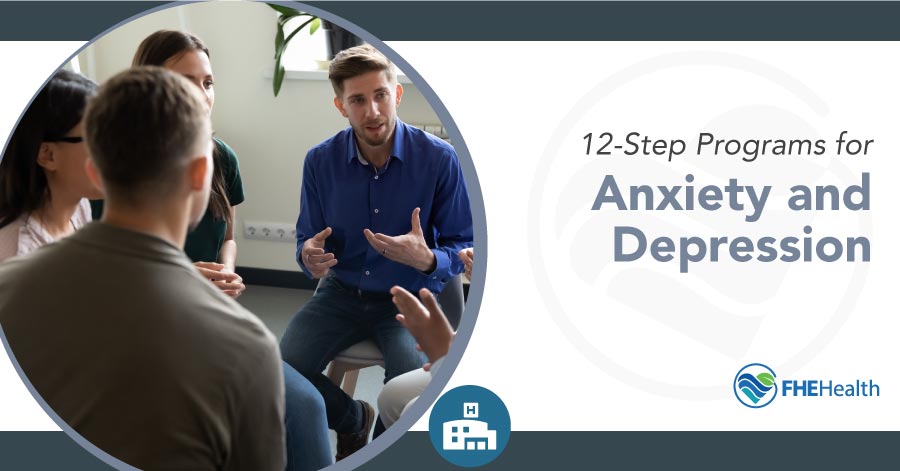
The road to recovery from anxiety, depression and other mental health issues can be daunting. There are still many people who may not even realize what they’re suffering from; worst of all, many of those who do are afraid to talk about it openly. Communities all across the world suffer from a shortage of available mental health care, and even when care is available, some may find their insurance only covers up to 20 therapy sessions per year.
Resources and time to dedicate to the individual patient are often limited, leaving both the client and the provider seeking a better solution that may provide a more adequate amount of time for the healing process to fully flourish.
What Is a 12-Step Program?
Famously created by Alcoholics Anonymous (AA), 12-step programs are designed to take someone who’s suffering from something like alcohol addiction, gambling addiction, or narcotics addiction and help to create a better sense of understanding, a method to coping and a sense of community. This is done through a 12-step process that, when sought with an outward perspective, can be seen as a great foundation on the path to beating those addictions with like-minded people.
The power of these groups lies in the ability to maintain total anonymity while allowing yourself to become completely vulnerable and truly see, often for the first time, that you’re really not alone in your struggle. Consider joining a 12-step program for depression, anxiety, or whatever you’re working through.
What Is Emotions Anonymous?
Founded in 1971, the Emotions Anonymous 12-step recovery program shares structural similarities with Alcoholics Anonymous but is for people who suffer from emotional issues. The program is great for people who are experiencing anxiety, loss, depression, grief, anger, low self-esteem and many other emotional stressors. There are 12-step programs for depression and anxiety and for many different emotional and mental health issues; if you don’t see yours immediately, consider reaching out to your local meeting center for more information on how and when these specifically needed sessions could take place.
600 Active Groups
There are more than 600 active groups in 30 countries that offer group meetings and apply the 12-step approach used in AA. The goal of the Emotions Anonymous 12-step program is to help the individual attain full psychosocial function while also avoiding negative or self-harming behaviors.
No Sharing Required
As the name “anonymous” would suggest, members are not required to disclose personal information. This allows participants to share as much or as little as they’re comfortable doing while still benefiting from the Emotions Anonymous program as a whole.
A Higher Power & Community
Although the 12 steps focus on finding help and peace in a higher power, this concept is open to interpretation among its members. A major benefit of this group for newcomers is the idea that no one is alone in their struggle, while situations and symptoms may differ, the underlying depression and anxiety remain the same.
Groups for Behavioral Problems
Members are not required to stop any medications, and group meetings can be used in conjunction with traditional therapy. Sometimes, 12-step programs are even suggested by therapists for additional support. The sense of community from these groups can be of great value to members who struggle with loneliness. The act of getting out of the house and attending a meeting can serve as an accomplishment as well.
This 12-step Emotions Anonymous program can also be adapted to other problem behaviors, too, such as helping bipolar patients who suffer from compulsive spending or adult children of alcoholics who have feelings of worthlessness from an abusive childhood.
Codependents Anonymous, for example, addresses the issues of feeling responsible for another person’s success or failure, which may lead to depression, panic attacks and more. Each program offers a sense of understanding and a wealth of anecdotal support from members who have lived similar experiences.
Mental Health Conditions We Treat

ADD & ADHD
A disorder in which individuals display characteristics such as distraction, impulsiveness, hyperactivity and poor attention.
Learn More
Anxiety
Anxiety can be described as the constant feeling of an alarm going off when an individual feels stressed or threatened.
Learn More
Bipolar Disorder
A disorder which causes changes in an individual’s moods, energy levels and prevents the ability to handle day-to-day tasks.
Learn More
Depression
When left untreated, depression can lead to serious long-term effects, such as feelings of loneliness and thoughts of suicide.
Learn More
Eating Disorders
A condition in which an individual displays abnormal eating habits, negatively affecting their mental and physical health.
Learn More
OCD
A mental health disorder in which individuals frequently experience repetitive, obsessive thoughts and compulsive behaviors.
Learn More
Personality Disorder
A personality disorder can significantly disrupt the lives of both the affected person and those who care about that person.
Learn More
PTSD
A disorder that may develop after experiencing or witnessing something traumatic, shocking, scary, or life-threatening.
Learn More
Substance Abuse
Most individuals suffering from substance abuse disorder may want to quit using, but the urges are too strong to control.
Learn More
What Are the 12 Steps of Emotions Anonymous?
Borrowing from the success of other 12-step programs, Emotions Anonymous cements itself with 12 mission-fulfilling steps that act as pillars in the overall EA program. The 12 steps of AA are each set in a specific order, although the amount of time an individual may spend on any one particular step is different for everyone.
12 Steps of AA
- Admitting powerlessness over emotions
- Acknowledging a higher power
- Turning one’s life over to that higher power
- Taking a moral inventory
- Admitting personal wrongs
- Acknowledging the ability of the higher power to remedy character defects
- Asking the higher power to remove any personal shortcomings
- Listing the people one has harmed and developing a willingness to make amends
- Whenever possible, making amends with any individuals who have been harmed
- Taking personal inventory on a continual basis and admitting any wrongs
- Improving one’s connection with a higher power through prayer and meditation
- Living the Emotions Anonymous principles and sharing the program’s message
Testimonials From Emotions Anonymous
Beginning the process of life reconciliation, whether from mental health issues, addiction or both, can be incredibly difficult without a support system. It can also be pretty intimidating to put yourself out there to try to beat something or get help again once you’ve had past failures. We collected a few testimonials from participants who’ve undergone the Emotions Anonymous program and found success.
“EA will always be a gift for anyone that wants to start a meeting no matter how old or new one is to the program as I am lucky to start the program as young as I did as I’m 51 but have 21 years in.” — Lee R.
“This program is giving me my Life Back and My Inner true Self…” — Tanya M.
“WHAT IF… Worrying is thinking about ‘what if something goes wrong’. Dreaming is thinking about ‘what if everything goes right’. Both are necessary. When I get out of balance with either one, I need a way to keep from capsizing. To do that I take some steps. For me, EA is all about that.” — Janet H.
Get the Help You Need
Now that you’ve learned about the power of Emotions Anonymous, are you ready to take the next step? Give us a call at FHE to get started on the road to recovery from your mental health issues today at (833) 591-1536.
Plus, joining a 12-step Emotions Anonymous program for depression, for instance, can provide an invaluable community of support. We’re open 24/7, 365. Your journey to relief can start today.






